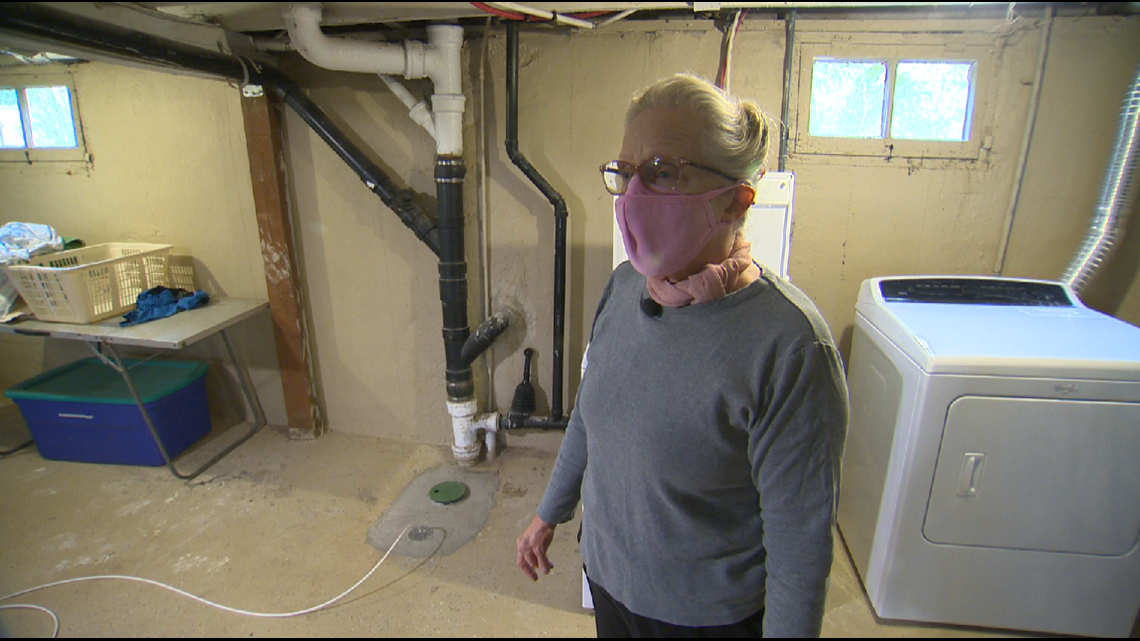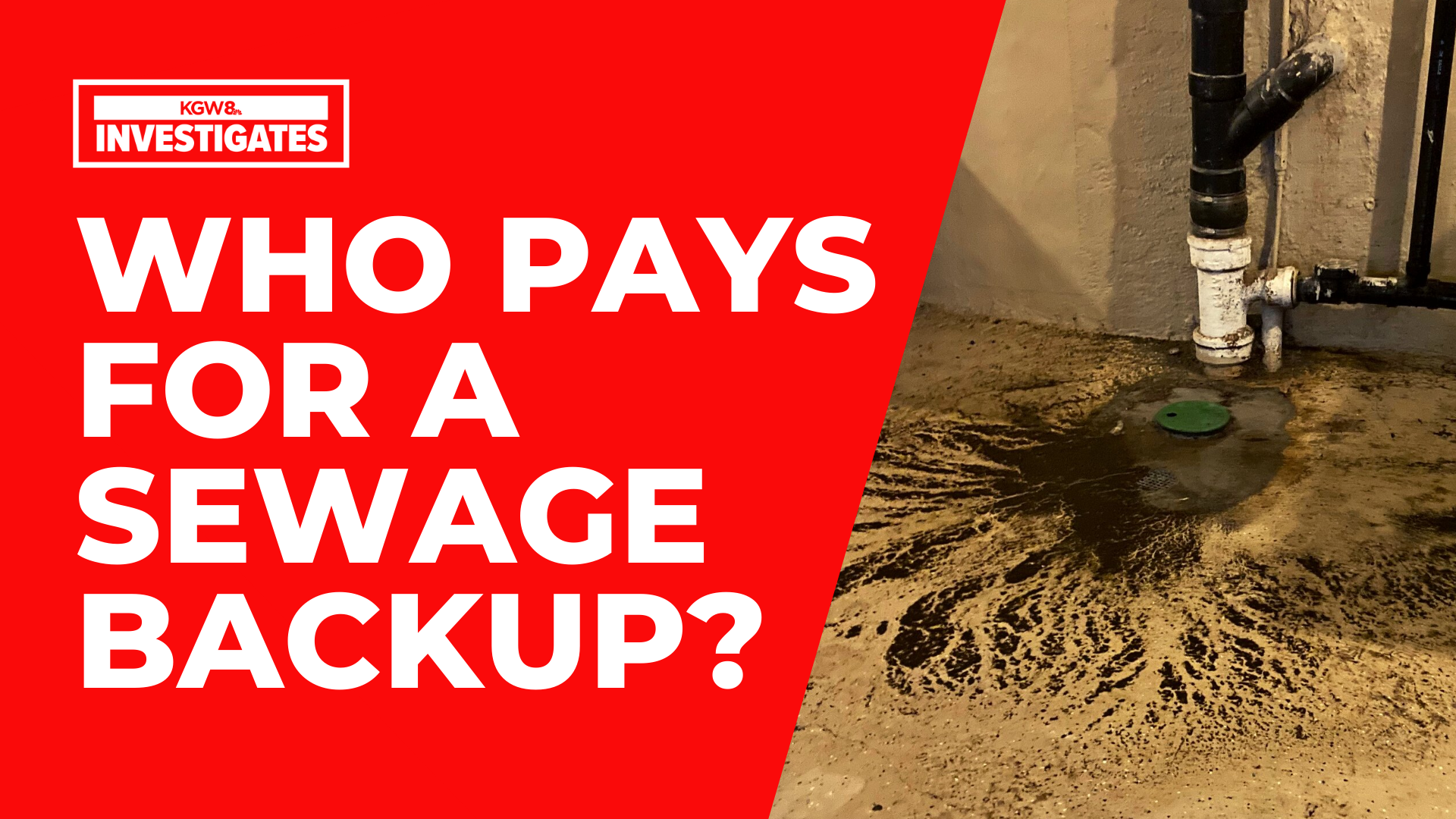PORTLAND, Ore. — Anne-Louise Vernon got a raw deal after a city sewer line backed up last June, flooding the basement of her Southeast Portland home.
“The smell was gag-making. It was so disgusting,” said Vernon.
As nasty smelling toilet water and dark, raw sewage overflowed from her floor drain, Vernon scrambled to find help.
“It was pretty clear I had to do something because it wasn’t something that could wait,” explained Vernon.
A plumber helped identify the problem. Then, clean-up crews spent several days, drying out the basement and decontaminating her home.
“When I got the bill for over $5,200 I was practically in the fetal position,” said the retiree, who relies on social security for income. “I was devastated. That’s a really huge financial burden for me.”


Vernon figured the city would reimburse her for the emergency clean-up. After all, the city crew that first responded from the Portland Bureau of Transportation clearly noted on paperwork that the responsibility falls on the city.
Inspectors with the Bureau of Environmental Services determined the main sewer line, the one beneath the street, was backed up.
The sewer main “runs very flat and it is reported to have some sags along the line where debris collects and build up over time,” wrote city engineer Jorge Villavicencio in a letter summarizing the backup.
So, did the city pay? Not really.
The city’s risk management division, which handles claims, argued the city is not responsible for clean-up costs.
“As the city has maintained this sewer line in a reasonable manner and it was not on notice of any prior issues, we conclude that the city is not liable,” wrote Karen Bond, a senior claims analyst with the city of Portland in a denial letter.
The city did offer Vernon roughly $1,500 to help pay for the plumber and half her homeowner’s insurance deductible, but that covered only a small portion of her $5,000 clean-up bill.
“They don’t want to pay and they feel they can blow me off. I’m a little old lady,” said Vernon. “They’ll make it as hard as they can, so I’ll go away.”
Vernon is not alone. A KGW investigation found over the past three years, 194 Portland property owners have sought compensation for similar sewer backups. Of those, the city has paid out more than $360,000, with more pending.
But those who file claims represent just a fraction of the people affected by sewer backups. Since 2018, city crews have responded to more than 1,500 urgent sewer release calls.
These sewage backups are part of a larger problem — Portland’s sewer infrastructure is old and overburdened. Much of the city’s sewer pipe system is more than 80 years old.
“We are heavily invested in upgrading older pipes so they can be reliable now and into the future,” said Diane Dulken, spokesperson for the Bureau of Environmental Services.
Dulken explained the city is gradually working to replace aging and undersized sewer pipes. The incremental improvements appear to be working.
The number of urgent calls for sewer backups has started to decline from 455 in 2019 to 382 in 2020. So far this year, there have been 294 urgent calls to report sewer backups.
BES has identified properties that are at a significant risk of basement sewer backup.
Not all basement backups involve old, crumbling sewer lines. There can also be unforeseen problems like tree roots, cooking grease or stuff people shouldn’t flush down the toilet that can also clog sewer pipes.
“Most sewage backups are preventable,” warned Dulken. “They’re preventable by the city to do large scale construction projects to replace the pipes and they’re preventable by residents by not flushing things that should not go down the drains.” The city has a video on its YouTube page with information on what not to flush.
Vernon believes her basement backup was no freak accident.
City engineers determined it was a soft plug, or blockage built up over time, in the sewer main that caused her basement backup. Debris had built up in the sags of the sewer main, which is flat with not enough flow to clear it out.
“The line will be placed on an accelerated cleaning schedule until a capital improvement project can address the sags in the line,” wrote Bond, the claims analyst with the city of Portland in a letter to Vernon.
“It was made very clear to me that it was not my line. It was the city main. So had that not been clogged, I would not have had putrid, raw sewage in my basement,” said Vernon.
The U.S. Environmental Protection Agency (EPA) requires municipalities to clean up buildings contaminated by sewage backups.
“When backups are the result of conditions in the municipal sewer system, the municipality is responsible for cleaning up and preventing backups,” wrote the EPA in an Enforcement Alert bulletin published in 2006.
Other local governments follow the EPA requirement, including the city of Gresham.
“Unless it is 100% certain the sewer backup occurred in the private line, the city will pay for a preliminary cleanup,” explained the city of Gresham in a brochure titled, ‘Sewer Backup?’
Gresham has a contract with a private service provider to perform this clean-up at no charge to the homeowner or tenant. If necessary, Gresham will also pay for the homeowner to stay in a hotel during clean-up.
The Portland’s risk management division, which pays out claims — declined KGW’s request for an interview to discuss Vernon’s claim and general policies surrounding sewer backups.
In an email, a spokesperson explained a variety of factors go into evaluating a claim, including compliance with legal notice, timeliness requirements and factual consideration.
“The city pays all claims for which it is determined to be legally liable,” wrote Heather Hafer, spokesperson for the Office of Management and Finance.
Vernon, however, feels all this legal jargon stinks. She’s on a fixed income, can’t afford a lawyer and is disappointed that the city isn’t budging.
“You start wondering, ‘How many other people have had the backups and then gotten the shaft by the city?” asked Vernon.
The 67-year-old Portland resident said she doesn’t have $2,000 to pay her homeowner’s insurance deductible, plus she worries it will raise her insurance rates.
The city said it is not aware of any resources for people who cannot afford clean-up costs associated with sewer backups—which means Vernon is stuck.
She’s sitting on a $5,000 clean-up bill after a city sewer main backed up, flooding her basement with putrid, raw sewage.
“They act like it is no big deal,” said Vernon. “I feel like I’m being treated kind of like what they deposited in the basement.”

